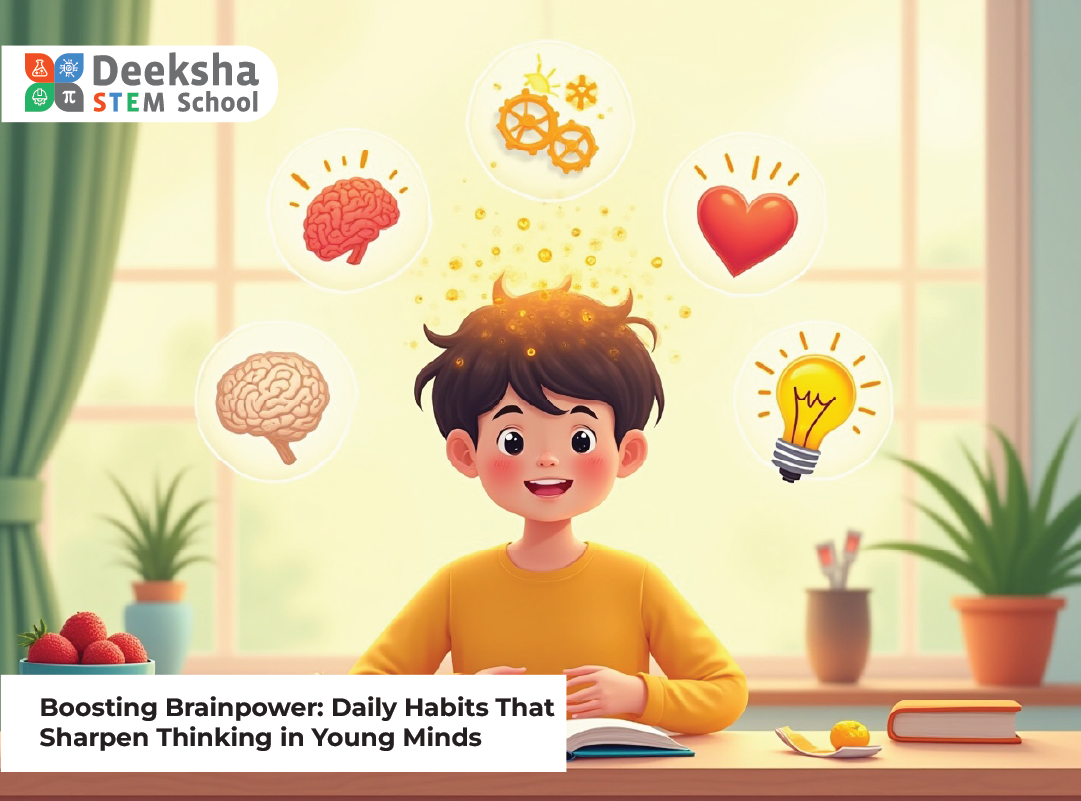Boosting Brainpower: Daily Habits That Sharpen Thinking in Young Minds

Helping children develop sharp thinking skills goes beyond academic lessons and classroom time. It’s about the everyday habits that shape the brain’s performance, mental clarity, and resilience. From the moment they wake up to how they wind down before bed, these daily routines can strengthen cognitive development, emotional regulation, and creativity. When healthy habits are formed early, they lay the foundation for a child’s lifelong ability to think critically, solve problems, and adapt with ease.
At Deeksha STEM Schools, we focus on more than just academic content. We recognize the importance of nurturing the whole child—mentally, physically, and emotionally—through daily practices that enhance brainpower in real, sustainable ways.
Why Brainpower Matters Early On
Early cognitive development affects more than classroom performance. It influences a child’s ability to form meaningful relationships, express themselves, make decisions, and bounce back from setbacks. These foundational skills empower them to become capable individuals in an increasingly complex world.
| Cognitive Skill | Impact on Child’s Growth |
| Memory | Strengthens learning retention and academic recall |
| Focus | Improves concentration during tasks and minimizes distractions |
| Problem-solving | Builds logical reasoning, critical thinking, and adaptability |
| Emotional regulation | Enhances self-control, empathy, and social confidence |
| Creative thinking | Promotes innovation, imagination, and out-of-the-box solutions |
Daily Habits That Boost Brain Function
1. Nutritious Breakfast
Breakfast is the brain’s first fuel of the day. A mix of protein (like eggs or nuts), whole grains, and fruit helps improve attention span, mood, and memory. Avoid sugary cereals and instead opt for oats, smoothies, or nut butters for sustained energy.
2. Consistent Sleep Schedule
Sleep directly influences how well children process information, retain memories, and regulate emotions. Maintain a consistent bedtime and limit screen time before bed. Ideal sleep duration for school-aged children is 9–11 hours.
3. Physical Activity
Movement helps more than just muscles. It stimulates neurogenesis—the creation of new brain cells. Activities like running, swimming, dancing, or yoga can boost mental clarity and elevate mood.
4. Reading Every Day
Daily reading—even 15–20 minutes—enhances comprehension, expands vocabulary, and fosters emotional intelligence. Encourage your child to read across genres to broaden their perspective.
5. Mindful Breaks and Downtime
Short brain breaks using deep breathing, guided meditation, or even mindful coloring can refresh the mind. Children who pause between tasks return with greater focus and reduced mental fatigue.
6. Screen-Free Play and Creativity
Free play is critical for brain development. Building with blocks, drawing, storytelling, and role-play enhance motor coordination, imagination, and emotional expression.
7. Staying Hydrated
Even mild dehydration can impact mood, memory, and attention. Teach children to drink water regularly. Add lemon slices or fruit-infused water to make hydration fun.
8. Positive Peer Interaction
Interacting with friends teaches negotiation, empathy, and communication. Whether it’s through team games or collaborative learning, these social experiences shape a child’s mental agility.
9. Healthy Snacking
Snacks like nuts, seeds, fruit, and yogurt help sustain brain energy levels. Avoid frequent consumption of chips, candy, or sodas that can lead to energy crashes.
10. Goal Setting and Reflection
Help children set small daily or weekly goals, and encourage them to reflect on what went well. This builds self-awareness and the ability to self-regulate and plan ahead.
How Deeksha STEM Encourages These Habits
At Deeksha STEM, our holistic approach to education ensures students don’t just learn—they thrive.
- Balanced Daily Routine: Every school day includes dedicated time for learning, reflection, exercise, and play
- Wholesome Meal Programs: Meals offered are rich in brain-friendly nutrients and free of excess sugar
- Mindfulness Curriculum: Breathing exercises, quiet time, and emotional check-ins are built into the daily flow
- Integrated Movement: From classroom energizers to dedicated PE sessions, we keep students active
- Enriched Learning Spaces: Classrooms, labs, and reading corners are designed to stimulate cognitive engagement
- Peer Collaboration: Students learn through group projects and peer mentorship that foster healthy communication and teamwork
- Teacher Mentorship: Educators model and reinforce good habits, including emotional regulation and focus routines
Tips for Parents to Support Brain Growth at Home
- Create a Visual Daily Schedule: Help children stick to a routine with illustrated charts and planners
- Model Brain-Friendly Behavior: Children mimic adult behavior. Read, reflect, and stay active yourself
- Play Strategy-Based Games: Board games like chess, puzzles, and riddles challenge the brain in fun ways
- Talk About the Day: Daily conversations about highs and lows encourage introspection and emotional balance
- Create a Relaxing Sleep Ritual: A warm bath, reading time, or soft music can improve sleep quality
- Celebrate Curiosity: Encourage your child to ask “why” and explore answers together
Frequently Asked Questions
1. How much sleep does a school-age child really need?
- Children aged 6 to 13 typically need between 9–11 hours of uninterrupted sleep each night. Adequate rest enhances memory, mood regulation, and attention span.
2. What are some brain-friendly foods?
- Foods rich in omega-3s (like walnuts and flaxseeds), antioxidants (like berries), and complex carbs (like whole grains) are great for the brain. Water and fresh fruits help keep the brain hydrated and energized.
3. How can I make my child more focused?
- Create a clutter-free study space, use a timer for focus blocks (like the Pomodoro method), and include 5–10 minute movement or hydration breaks between tasks.
4. Does exercise really improve thinking skills?
- Yes. Physical activity stimulates parts of the brain involved in memory, concentration, and emotion. Activities like cycling, jumping rope, or even brisk walking enhance mental clarity.
5. How does Deeksha STEM support mental sharpness?
- We support brain development through interdisciplinary learning, active lessons, daily mindfulness, peer engagement, and personalized guidance—all designed to sharpen thinking and foster emotional balance.
Final Thoughts
Developing a sharp mind in children doesn’t require complex tools—it begins with simple, daily choices. From a glass of water in the morning to a calm bedtime routine, every small habit contributes to a child’s cognitive fitness.
At Deeksha STEM Schools, we understand the science behind brain development and weave it into our everyday practices. Our students not only gain academic knowledge but also adopt routines that empower them mentally and emotionally for life.
Visit our campuses at Bannerghatta Road, Judicial Layout, Kengeri, and Vidyanagar to see how brain-boosting habits are shaping the next generation of thinkers, leaders, and innovators.




